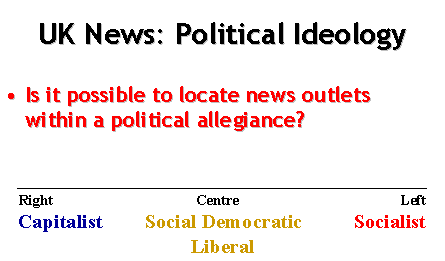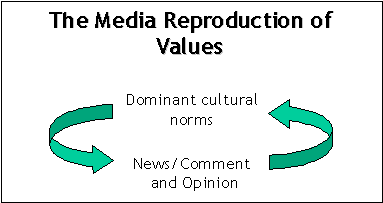The Role & Function of the Media in Society
|
It’s about a year since we last got together to have a discussion about the impact of the media on people in society. We discussed, particularly, the implications of news viewpoints for those seeking asylum and we looked at the blatant and discrete racism that can be found in both broadsheet and tabloid newspapers. That analysis was largely concerned with the press and racism; we should now extend this and explore it further to understand (in line with discussing social sciences) the function of the media in society. What do I mean by function? Well, quite simply – the media is a functional organism that carries out a specific role in society. This role, as we shall see, has changed over time, but is still to be critically examined in furthering our understanding of society, inequality and youth work. SOME
PERSPECTIVES During
this session, we’re going to be making links to much of what we know
already about sociology, politics and inequality and extending these
into analysing the media. Some perspectives that we will be engaging with include:
DEFINING
‘MEDIA’ So what constitutes media? Well, it would be impossible for us to explore all media sources – for it can be found in a vast array of outlets – from the daily newspapers to the hundred or so digital channels you can now receive through your television set. Mass media concerns itself with genres spanning from household hobbies, through to the worldwide soap operas. It discusses, debates and articulates politics, music, theatre, sport; art…the list of subject matter is immeasurable. What we will concern ourselves with today, however, is the presentation of news. IDEOLOGY
AND MASS MEDIA In a short while, we shall explore how news in this country became ‘concentrated’ and what implications this has on democracy and citizenship. When we come to discuss ideology and the media, there are several strands that help us explore this concept.
Firstly, what underpins an ideology? As discussed last year, newspapers align themselves with the views of a political ideology. So, if we consider the blurred spectrum of political views (left to right), where does each of the main news providers find themselves located? Any ideas? While the location of political allegiance can indeed help us to understand a news viewpoint, it also important to remember that, no matter what bias, there are the more pervasive, dominant cultural norms that have influence in news reporting. Although this is arguably more powerful, it threads through our news in such a discrete way. It is common sense thinking regurgitated.
I refer to this process as ‘the press reproduction of values’. The essence of engaging with anti-oppressive practice, and social sciences (in my opinion) is about learning to be critical. It is not about agreement or acceptance of my views, or anyone else’s. But it is acknowledging the importance of youth work values, and how we – as practitioners – intend on translating them to practice. In essence, these values are about critical enquiry and 'not taking things for granted'. The model shows how a cycle of reproduction happens everyday. The dominant culture’s assumption that it is ‘normal’ is recreated time and time again without question – through education, government and in this case – the media. Another serious consideration we should make when discussing the media and ideology, is the question of ownership
Newspapers were founded upon the principle of disseminating information that was of public concern, to the public. The situation that occurs now is that media is concentrated in ownership. Fewer people own larger media corporations, and these views become ‘monopolized’. It is almost impossible to gain a different perspective, or even a news product that is free of bias. An example of this issue can be related to the DMGT as presented here. Well, I can
imagine some of you thinking – so what? Ownership, however, has in the
past played serious games with democracy and freedom. Some examples
include the Daily Mail editor receiving a knighthood for
‘services to journalism’ by Margaret Thatcher in 1982. This proceeded
years of vilification of the Labour party and its policies. Perhaps more disturbingly was Rupert Murdoch’s banning of the BBC from China. Murdoch was anxious to establish a new television network in the country, and following the BBC’s reporting of Human Rights abuse there, he swiftly threw the news provider off his network to appease the Chinese government. This, coupled with selective reporting on his own Sky News, can show how ownership can dictate literally what news you choose to present. Where did it all go wrong? Well, in order to find the problem we need to dig to the origins of news production. One theory may enable us to examine this... HABERMAS:
THE PUBLIC SPHERE The public sphere evolved as a place of discussion, in salons and coffee houses throughout London, Paris and other European cities. People gathered to discuss literature, and before long this expanded into politics. Make no mistake; the early nature of the public sphere had the stench of exclusivity about it. Imagine the setting, a group of upper class, white men sitting comfortably around a knee-high table, smoking cigars and sipping tea, whilst the discussions of literature then expanded further into politics. Has everyone here seen Titanic? Well, it had to be something like that – “thank you ladies, for an excellent supper – we’re off to the smoking room for port and a discussion”. However, as exclusive and restricted as it was, this was a foundation of political criticism – and although these voices weren’t truly representative – they were certainly ready to challenge the status quo. This new emerging sphere marked the needed linkage between private life and state control. A sphere where critical scrutiny aimed at the state, on behalf of the public, began to thrive. The next stage in the expansion of the Public Sphere
was to further the dissemination of viewpoints through the medium of
newspapers. Starting out as small outfits, these provided information to
the public and also served as a mass communiqué for the ‘public
sphere’. However, with the rise of capitalism, so came the rise of
concentrated news – culture began to shape into a more trivial, marketed
concept – replacing and stifling this civic debate. The emergence of
monopoly capitalism led to the foundation of the commercialisation of the
press. Distinctly, journalists became ‘specialists’ and
‘professionals’ and, as Habermas reports, the search for the exposure
of political domination by the use of reason was replaced by the
imposition of an ideological consensus through the mechanisms of economic
and political manipulation. The growth of the gap between public and private life
began to cement itself into society. Culture had become a ‘take-away’
phenomenon, with the arrival of news on television and radio further
aiding the death of discussion. News is transmitted to the receiver and
the receiver is disallowed the possibility of talking back. Democratic
involvement takes a further blow. And so we find ourselves with the political public sphere we have today. Each day, millions of major events happen throughout the world. Political errors and triumphs can pass us by without any intervention or interest on our part. We hear the phrase ‘spin’ frequently used – with New Labour etc? Well, is this a new process in politics? We should be saying no, of course not. It is the current situation at the end of years of dumming down. Political events and stories are carried to use in a package that is easy to digest, mass produced and readily understandable – and we lie back and take it in, without thought or criticism. Well,
I hate to break this to you, but THAT LYING BACK AND TAKING IT IN that I
discussed earlier, just won’t cut any ice in this field of work. Ok, so
lets leave my rather obvious values aside and ask this question: what is a
good youth worker and what isn’t? We should surely have some idea by
now? Let’s
look to the practice standards required of a JNC youth worker undertaking
training. We find ourselves with criteria that demand of us to:
“increasingly question ‘taken for granted’ assumptions and
beliefs”. We read in Jeffs and Smith that the central aim of youth work
is to foster democracy. Kerry Young’s book is laced with an appeal for
youth workers to aid young people in the development of their critical
thinking. Yet, and by and large, people still chose to pretend that they
are not part of change. People still, day in and day out, presume that
they are not involved in anything of significant value. But,
we should be worried. The more that we hear about the stripping of our
ability to question those who govern us, the more we should be out and out
scared. I hear some version of the public sphere everyday. It’s on the
bus when people say that if people haven’t done anything wrong – why
should they worry about carrying ID cards. Then, I remember that black men
were disproportionately stopped and searched following the Criminal
Justice Act of 1994, and I think to myself – what would happen if they
don’t have their card with them. It’s
in the pub, when people say that they believe that Hague was right to
speak up about asylum seekers because the numbers are rising and they are
draining public services. Then I remember, aren’t applications falling?
Isn’t it that the Channel Tunnel pissed off with recent government
inaction over their security costs, that suddenly the ‘news’ comes out
that people try to get through the tunnel every night. Can the Daily
Express possibly run consecutive stories about asylum seekers for 21 days
with a strong case? And, then lets not forget – why do these people
become displaced? So, if this is the public sphere. If this is where democracy is, then we should be more than concerned. For this is where more than ever, dissent is needed. A sense of criticism that can be as loud as the voices that shouts their orders down at us. Edited extract taken from "Understanding the Role and Function of Mass Media Communications in Society" - a lecture by Jason Wood given at De Montfort University, October 2001. |
Please always reference the author of this
page. How to reference
us.
Copyright © 1999-2002 Student Youth Work Online. All rights reserved.
Revised: March 17, 2002
.


